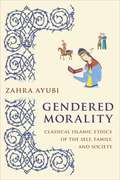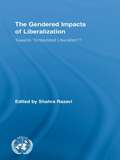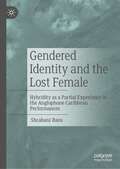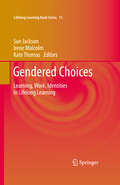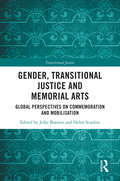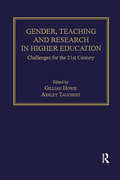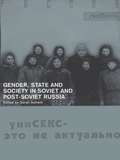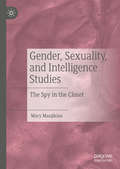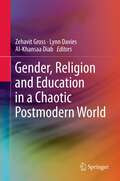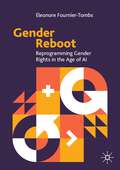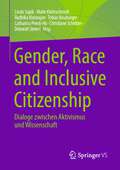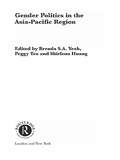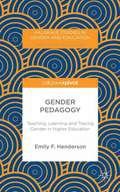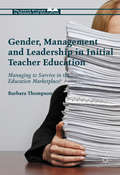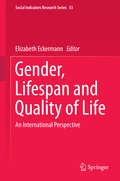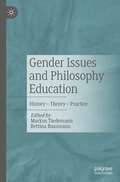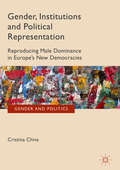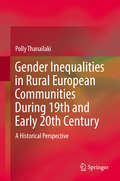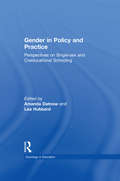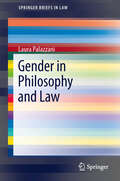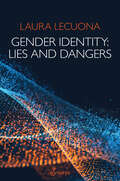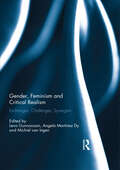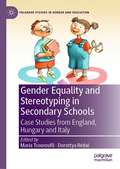- Table View
- List View
Gendered Morality: Classical Islamic Ethics of the Self, Family, and Society
by Zahra M. AyubiIslamic scriptural sources offer potentially radical notions of equality. Yet medieval Islamic philosophers chose to establish a hierarchical, male-centered virtue ethics. In Gendered Morality, Zahra Ayubi rethinks the tradition of Islamic philosophical ethics from a feminist critical perspective. She calls for a philosophical turn in the study of gender in Islam based on resources for gender equality that are unlocked by feminist engagement with the Islamic ethical tradition.Developing a lens for a feminist philosophy of Islam, Ayubi analyzes constructions of masculinity, femininity, and gender relations in classic works of philosophical ethics. In close readings of foundational texts by Abu Hamid Muhammad al-Ghazali, Nasir-ad Din Tusi, and Jalal ad-Din Davani, she interrogates how these thinkers conceive of the ethical human being as an elite male within a hierarchical cosmology built on the exclusion of women and nonelites. Yet in the course of prescribing ethical behavior, the ethicists speak of complex gendered and human relations that contradict their hierarchies. Their metaphysical premises about the nature of the divine, humanity, and moral responsibility indicate a potential egalitarian core. Gendered Morality offers a vital and disruptive new perspective on patriarchal Islamic ethics and metaphysics, showing the ways in which the philosophical tradition can support the aims of gender justice and human flourishing.
The Gendered Impacts of Liberalization: Towards "Embedded Liberalism"? (Routledge/UNRISD Research in Gender and Development)
by Shahra RazaviIn the last two decades public policies have reflected a drive for accelerated global economic integration ("globalization"), associated with greater economic liberalization. The outcomes have been largely disappointing, even in the estimate of their designers. Rural livelihoods have become more insecure, and the expected growth has rarely materialized. Insecurity is also etched into the growth of informal economies across the world. Yet the economic policy agenda that has been so adverse to many people around the world has also provided new opportunities to some social groups, including some low-income women. In response to widespread discontent with the liberalization agenda, more attention is now being given to social policies and governance issues, viewed as necessary if globalization is to be "tamed" and "embedded". The contributors to this volume address key issues and questions such as whether states have the capacity to remedy the social distress unleashed by liberalization in the absence of any major revision of their macroeconomic policies and whether the proposed social policy reforms can redress gender-based inequalities in access to resources and power.
Gendered Identity and the Lost Female: Hybridity as a Partial Experience in the Anglophone Caribbean Performances
by Shrabani BasuThis book offers an exploration of the postcolonial hybrid experience in anglophone Caribbean plays and performance from a feminist perspective.In a hitherto unattempted consideration of Caribbean theatre and performance, this study of gendered identities chronicles the postcolonial hybrid experience – and how it varies in the context of questions of sex, performance and social designation. In the process, it examines the diverse performances of the anglophone Caribbean. The work includes works by Caribbean anglophone playwrights like Derek Walcott, Mustapha Matura, Michael Gikes, Dennis Scott, Trevor Rhone, Earl Lovelace and Errol John with more recent works of Pat Cumper, Rawle Gibbons and Tony Hall. The study would also engage with Carnival, calypso and chutney music, while commenting on its evolving influences over the hybrid imagination.Each section covers the dominant socio-political thematics associated with the tradition and its effect on it, followed by an analysis of contemporaneously significant literary and cultural works – plays, carnival narrative and calypso and chutney lyrics as well as the experiences of performers. From Lovelace’s fictional Jestina to the real-life Drupatee, the book critically explores the marginalization of female performances while forming a hybrid identity.
Gendered Choices
by Sue Jackson Kate Thomas Irene MalcolmThis important book breaks new ground in addressing issues of gendered learning in different contexts across the (adult) life span at the start of the 21st century. Adult learning sits within a shifting landscape of educational policy, profoundly influenced by the skills agenda, by complex funding policies, new qualifications and the widening/narrowing participation debate. The book is unique in highlighting the centrality of gendered choices to these developments which shape participation in and experiences of lifelong learning. Gendered Choices critically examines the continued expansion of a skills-based approach in areas of lifelong learning, including career decisions, professional identities and informal networks. It explores key intersections of adult learning from a gender perspective: notably participation, workplace learning and informal pathways. Drawing on research from a range of contexts, Gendered Choices demonstrates that for women the public/private spaces of work and home are often conflated, although the gendering of 'choice' has largely been ignored by policy makers. The themes of the book bring together some of these critical issues, explored through the multiple and fractured identities which constitute gendered lives. The book addresses these in an international context, with contributions from Canada, Spain and Iran that provide a wider international perspective on shared issues.
Gendered Agents: Women and Institutional Knowledge
by Silvestra Bové Paul A. BovéGendered Agents, edited by Silvestra Mariniello andPaul A. Bové, presents essays by influential feminist theorists who challenge traditional Western epistemology and suggest new directions for feminism. By examining both literary and historical discourses, such critics as Gayatri Spivak, Hortense Spillers, and Lauren Berlant assess questions of sexuality, ethics, race, psychoanalysis, subjectivity, and identity.Gathered from various issues of the journal boundary 2, the essays in Gendered Agents seek to transform the model of Western academic knowledge by restructuring its priorities and values. In the introduction, Mariniello urges feminists to begin anew but take as their starting place the achievements of feminism and feminist theory: an understanding of language that considers the implications of silence, the motivation to decompartmentalize experience, and the acknowledgement that everything is political. Challenging both a canonical organization of knowledge and the persistently self-referential "ghettoization" of feminism, contributors subsequently tackle subjects as diverse as pre-Marxist France, the American fetus, black intellectuals, queer nationality, and the art of literary interpretation.Contributors. Lauren Berlant, Karen Brennan, Margaret Cohen, Nancy Fraser, Elizabeth Freeman, Carol Jacobs, Silvestra Mariniello, Larysa Mykyta, Laura Rice, Ivy Schweitzer, Doris Sommer, Hortense J. Spillers, Gayatri Chakravorty Spivak, Judith Wilt
Gender, Transitional Justice and Memorial Arts: Global Perspectives on Commemoration and Mobilization
by Jelke Boesten and Helen ScanlonThis book examines the role of post-conflict memorial arts in bringing about gender justice in transitional societies. Art and post-violence memorialisation are currently widely debated. Scholars of human rights and of commemorative arts discuss the aesthetics and politics not only of sites of commemoration, but of literature, poetry, visual arts and increasingly, film and comics. Art, memory and activism are also increasingly intertwined. But within the literature around post-conflict transitional justice and critical human rights studies, there is little questioning about what memorial arts do for gender justice, how women and men are included and represented, and how this intertwines with other questions of identity and representation, such as race and ethnicity. The book brings together research from scholars around the world who are interested in the gendered dimensions of memory-making in transitional societies. Addressing a global range of cases, including genocide, authoritarianism, civil war, electoral violence and apartheid, they consider not only the gendered commemoration of past violence, but also the possibility of producing counter-narratives that unsettle and challenge established stereotypes. Aimed at those interested in the fields of transitional justice, memory studies, post-conflict peacebuilding, human rights and gender studies, this book will appeal to academics, researchers and practitioners.
Gender, Teaching and Research in Higher Education: Challenges for the 21st Century
by Gillian Howie Ashley TauchertGender, Teaching and Research in Higher Education presents new insights and research into contemporary problems, practical solutions, and the complex roles of teaching and learning in the international academy. Drawing together new research from contributors spanning a range of international and interdisciplinary perspectives, this book discusses topics of particular importance in the UK, USA, Australasia and South Africa, including: curriculum, boundary disciplines and research assessments, the Higher Education institution, educational practice, authority and authorization, teaching and counselling. Discussion of quality audits, curriculum modifications, teaching certificates and other key topics, add to this book's value in informing current debate and providing valuable research aids for education into the 21st Century.
Gender, State and Society in Soviet and Post-Soviet Russia
by Sarah AshwinOne of the few English language studies to focus on the male experiences, this book addresses the important questions raised by the rise and fall of the Soviet experiment in transforming gender relations. Issues covered include; * the paternal role * women as breadwinners * men's loss of status at work * changing gender roles in the press * the relationship between the sexual and gender revoloutions. Featuring an outstanding panel of Russian contributors, this collection is a valuable resource for students and scholars of Politics, Gender Studies and Russian Studies.
Gender, Sexuality, and Intelligence Studies: The Spy in the Closet
by Mary ManjikianThis is the first work to engage with intelligence studies through the lens of queer theory. Adding to the literature in critical intelligence studies and critical international relations theory, this work considers the ways in which both the spy, and the activities of espionage can be viewed as queer. Part One argues that the spy plays a role which represents a third path between the hard power of the military and the soft power of diplomacy. Part Two shows how the intelligence community plays a key role in enabling leaders of democracies to conduct covert activities running counter to that mission and ideology, in this way allowing a leader to have two foreign policies—an overt, public policy and a second, closeted, queer foreign policy.
Gender, Religion and Education in a Chaotic Postmodern World
by Lynn Davies Al-Khansaa Diab Zehavit GrossThe immense changes that the world is undergoing in terms of globalization and migration of peoples have had a profound effect on cultures and identities. The question is whether this means shifts in religious identities for women and men in different contexts, whether such shifts are seen as beneficial, negative or insufficient, or whether social change actually means new conservatisms or even fundamentalisms. Surrounding these questions is the role of education is in any change or new contradiction. This unique book enhances an interdisciplinary discourse about the complex intersections between gender, religion and education in the contemporary world. Literature in the social sciences and humanities have expanded our understanding of women's involvement in almost every aspect of life, yet the combined religious/educational aspect is still an under-studied and often under-theorized field of research. How people experience their religious identity in a new context or country is also a theme now needing more complex attention. Questions of the body, visibility and invisibility are receiving new treatments. This book fills these gaps. The book provides a strong comparative perspective, with 15 countries or contexts represented. The context of education and learning covers schools, higher education, non-formal education, religious institutions, adult literacy, curriculum and textbooks. Overall, the book reveals a great complexity and often contradiction in modern negotiations of religion and secularism by girls and boys, women and men, and a range of possibilities for change. It provides a theoretical and practical resource for researchers, religious and educational institutions, policy makers and teachers.
Gender Reboot: Reprogramming Gender Rights in the Age of AI
by Eleonore Fournier-TombsThis book explores gender norms and women’s rights in the age of AI. The author examines how gender dynamics have evolved in the spheres of work, self-image and safety, and education, and how these might be reflected in current challenges in AI development. The book also explores opportunities in AI to address issues facing women, and how we might harness current technological developments for gender equality. Taking a narrative tone, the book is interwoven with stories and a reflection on the raising young children during the COVID-19 pandemic. It includes both expert and personal interviews to create a nuanced and multidimensional perspective on the state of women’s rights and what might be done to move forward.
Gender, Race and Inclusive Citizenship: Dialoge zwischen Aktivismus und Wissenschaft
by Linda Supik Malte Kleinschmidt Radhika Natarajan Tobias Neuburger Catharina Peeck-Ho Christiane Schröder Deborah SielertDer zweisprachige Band untersucht Kämpfe und Regimes der Zugehörigkeit und diskutiert „Inclusive Citizenship“ in Originalbeiträgen und Konversationen von internationalen Forscher*innen und Aktivist*innen. Im Spannungsfeld von Acts und Regimes of Citizenship stellen sich hochpolitische Fragen der Agency zu Bewegungsfreiheit, digitalen Rechten, Zugehörigkeit zum städtischen Raum, Care und Sprache. Wir diskutieren diese im lokalen, regionalen, digitalen oder (trans-)nationalen Raum zu aktuellen Migrationsbewegungen nach und in Europa, rassismuskritischem und (queer-)feministischem Aktivismus gegen institutionelle und Alltagsdiskriminierung in ungleichen Gesellschaften.The bilingual volume examines struggles and regimes of belonging and discusses "inclusive citizenship" in original contributions and conversations by international researchers and activists. Between acts and regimes of citizenship, highly political questions of agency emerge about freedom of movement, digital rights, belonging to urban space, care, and language. We discuss these in local, regional, digital or (trans-)national space regarding current migration movements to and in Europe, and critical racism and (queer-)feminist activism against institutional and everyday discrimination in unequal societies.
Gender Politics in the Asia-Pacific Region (Routledge International Studies of Women and Place #No.3)
by Brenda S.A. Yeoh Peggy Teo Shirlena HuangAmidst the unevenness and unpredictability of change in the Asia-Pacific region, women's lives are being transformed. This volume takes up the challenge of exploring the ways in which women are active players, collaborators, participants, leaders and resistors in the politics of change in the region. The editors focus attention on the politics of gender as a mobilizing centre for identities, and the ways in which individualized identity politics may be linked to larger collective emancipatory projects based on shared interests, practical needs, or common threats. Collectively, the chapters illustrate the complexity of women's strategies, the diversity of sites for action, and the flexibility of their alliances as they carve out niches for themselves in what are still largely patriarchal worlds. This book will be of vital interest to scholars in a range of subjects, including gender studies, human geography, women's studies, Asian studies, sociology and anthropology.
Gender Politics and Mass Dictatorship
by Jie-Hyun Lim Karen PetroneUsing mass dictatorship as a working hypothesis to comprehend support for dictatorship from below, this book concentrates on the gender politics deployed by dictatorial regimes such as Nazism, Stalinism, 'really existing socialism' in the GDR and People's Poland, Maoist China, the development dictatorship in South Korea, and colonial empires. 20th century dictatorial regimes used gender politics as a lever to mobilize men and women as voluntary participants in state projects. Ironically enough, women under dictatorships could become important players in the previously male-dominated public sphere in exchange for voluntary mobilization. But both men and women were not passive objects of gender politics. Men both embraced and rejected the masculine roles set out for them; and the dictatorial regimes' invitation to participate in the public sphere, designed for the self-mobilization of women, was often used by women for self-empowerment. This book shows the twisted paths of citizens' lives under the dictatorial regimes as they veered between self-mobilization and self-empowerment.
Gender Pedagogy: Teaching, Learning and Tracing Gender in Higher Education
by Emily F. HendersonWhen addressed in its full reactive potential, gender has a tendency to unfix the reassuring certainties of education and academia. Gender pedagogy unfolds as an account of teaching gender learning that is rooted in Derrida's concept of the 'trace', reflecting the unfixing properties of gender and even shaking up academic knowledge production.
Gender, Management and Leadership in Initial Teacher Education: Managing to Survive in the Education Marketplace? (Palgrave Studies in Gender and Education)
by Barbara ThompsonThis book highlights the difficulties that women working as managers and leaders in initial teacher education face. Teacher education is at the forefront of education reforms and yet little is known about the professional lives of those who work within it. Whereas many women are moving into positions of authority in teacher training, some existing women managers are being marginalized within new internally differentiated layers of managerial structures. Yet other female managers, mainly new appointees, seem to endorse the discourses associated with new managerialist practices. Simultaneously some women who manage in teacher training are engaged in a struggle for survival individually and professionally. In the main, men seem to be missing from authority positions and will conclude that, in the current climate, the management of teacher training is ‘no job for a man’.
Gender, Lifespan and Quality of Life
by Elizabeth EckermannThis publication addresses the gender dimensions of people's lived experience and emphasizes how gender relationships differentially impact on women's and girls' as well as men's and boys' subjective well-being across the lifespan. It therefore fills a significant gap in the literature on quality of life and subjective well-being. The book brings together research which compares female's and male's subjective experiences of well-being at various life stages from a variety of countries and regions, particularly focusing on women's subjective well-being. Sex-disaggregation of data on objective conditions of quality of life is now routinely undertaken in many countries of the world. However, despite the burgeoning of objective data on sex differences in life conditions across the world, very little gender analysis is carried out to explain fully such difference and there is still a serious dearth of data on gender differences in subjective experiences of quality of life and well-being. This publication will assist researchers, teachers, service providers and policy makers in filling some of the gaps in currently available literature on the nexus between age and gender in producing differential experiences of subjective wellbeing.
Gender Issues and Philosophy Education: History – Theory – Practice
by Markus Tiedemann Bettina BussmannWith this volume a gap in the philosophical didactics is closed. A historical section initially introduces authors who have determined the gender discourse and at the same time a critical discussion. This is followed by an overview of sexual and gender diversity, its basics and differentiations. Theoretical papers then deal with the relevance of gender research for the self-understanding of philosophical education. Finally, practice-specific contributions demonstrate how topics and aspects of the gender problem can be prepared for different age groups and school types. With 2 lesson plans.
Gender, Institutions and Political Representation
by Cristina ChivaThis book traces the struggles over the institutions of political representation in Central and Eastern Europe, focusing on the factors that have held women back over the post-communist period, as well as on the growing evidence for change throughout the region. Post-communist Europe has long raised two puzzles for scholars of women's representation in politics. First, why have women been under-represented in politics in every country in the region since communism's collapse? Secondly, why are there relatively few cases where women's advocates have been successful in pressing for change? This comparative study of Europe's new democracies argues that these puzzles are best understood as questions about male dominance - that is, about the mechanisms that sustain, or, alternatively, change long-established patterns of male over-representation in politics over time. The author covers six EU member states - Bulgaria, the Czech Republic, Hungary, Poland, Romania and Slovakia - during the period 1990-2016. The book will be of use to students and scholars in the fields of Comparative Politics, Democracy and Democratization, European Studies, Gender Studies, Post-Communist Studies, and Central and Eastern European Studies.
Gender Inequalities in Rural European Communities During 19th and Early 20th Century: A Historical Perspective
by Polly ThanailakiThis book provides an overview of women’s opportunities for schooling, their social activities, and the social biases they faced in rural communities in Greece, Italy and parts of the Balkans during the 19th and early 20th century. It examines such topics as female illiteracy, the efforts of women-protestant missionaries to expand knowledge through Protestantism, the prejudice against education for women, the socio-economic context, the roles women fulfilled, and the structure of the patriarchal family. The book approaches these issues from the perspective of pedagogy and social history. The fundamental questions discussed by the book are: How was female education viewed by the country folk? What was the role of women in the private and the public sphere? How did peasant women respond to the challenges of the ‘modern’ world? Were they free to express their feelings and ambitions? In what way? Were they happy?
Gender in Policy and Practice: Perspectives on Single Sex and Coeducational Schooling (Sociology in Education)
by Amanda Datnow Lea HubbardThis book exposes the complexity of single-sex schooling, and sheds new light on how gender operates in policy and practice in education. The essays collected in this volume cover a wide range of institutions, including K-12 and higher education, public and private schools, and schools in the US and beyond. Detailing the educational experiences of both young men and women, this collection examines how schooling shapes-and is shaped by- the social construction of gender in history and in contemporary society.
Gender in Philosophy and Law
by Laura PalazzaniThis book is an introductory systematic framework in the complex and interdisciplinary sex/gender debate, focusing on philosophy of law.The volume analyses the different theories that have dealt with the gender category, highlighting the conceptual premises and the arguments of the most influential theories in the debate, which have had repercussions on the field of the ethical and juridical debate (with reference to intersexuality, transsexualism, transgender, homosexuality). The aim is to offer a sort of conceptual orientation in the complexity of the debate, in an effort to identify the various aspects and development processes of the theories, so as to highlight the conceptual elements of the theorisations to grasp the problem areas within them. It is therefore an overall synthetic and also explicative analysis, but not only explicative: the aim is to outline the arguments supporting the different theories and the counter-arguments too, for the purpose of proposing categories to weigh up the elements and to take one's own critical stance, with a methodological style that is neither descriptive nor prescriptive, but critical.
Gender Identity: Lies and Dangers
by Laura LecuonaThousands of pages of books, millions of characters in tweets and hundreds of blogs have been devoted to explaining the distinction between sex and gender, but far from clarifying anything, bewilderment for ordinary people is only growing.The concept of gender is central to a vaguely progressive-looking set of ideas based on the maxim that people possess a so-called ‘ gender identity' . The real problem arises when this nebulous concept, bandied about with different and even incompatible meanings by different groups, is used as a prop to introduce policies that mark a huge setback for the rights of women and girls. The general public, watching the controversy from the sidelines, is confused by conflicting claims about whose rights are being infringed.In this incisive book, Laura Lecuona sets the record straight by reviewing the origin of the current uses of the key term gender and exploring the main theories of transgenderism. She discusses what lies behind the claims about pronoun usage and warns about the consequences of promoting the recognition of so-called transgender children. She points out the collateral damage arising from this activism, from the perpetuation of sexist roles to limitations on freedom of speech. She dares to confront the accusations of transphobia that often inhibit those who question the foundations of this financially-driven and increasingly dominant ideology and shows the devastating effects transactivism is having on women, both socially and politically. Gender Identity: Lies and Dangers is essential reading for the urgently needed conversation we need to have about whose interests are being served with the advancement of transgender ideology and what this means for women' s sex-based rights.
Gender, Feminism and Critical Realism: Exchanges, Challenges, Synergies
by Lena Gunnarsson Angela Martinez Michiel Van IngenThis book marks a pivotal moment in the intensifying dialogue between the philosophical approach of critical realism and the fields of feminist theory and gender research. During the last three decades, these fields have been decisively influenced by poststructuralist perspectives. As such perspectives are increasingly being challenged, this book argues that critical realism is able to serve as a fruitful resource for carving out new paths for feminist theorizing and research. At the same time, it argues that feminist insights on gender and knowledge production have the potential to significantly enrich the field of critical realist philosophy as well. Hence, this book serves as a forum for a number of interventions that, in different ways, explore synergetic potentials as well as tensions between critical realist and various feminist perspectives. It engages in debates over the conditions of knowledge production and the relationship of knowledge to the world, offers new ways of understanding sex, gender and power, as well as the intersectional interplay of diverse power relations, and explores how critical realism relates to new materialist and postpositivist realist approaches. This book was originally published as a special issue of the Journal of Critical Realism.
Gender Equality and Stereotyping in Secondary Schools: Case Studies from England, Hungary and Italy (Palgrave Studies in Gender and Education)
by Maria Tsouroufli Dorottya RédaiThis book explores gender stereotyping and gender inequalities in secondary education in England, Hungary and Italy. The authors highlight the importance of addressing student and teacher attitudes if long-term changes in mindset are desired, as well as the underlying stereotypes that persist and linger in these educational contexts. Promoting a whole-school culture change approach, this book explores views of gender stereotypes from teachers and students concerning subject and career choices, as well as collaborative work with teachers, experts and NGOs in implementing and evaluating gender equality charters. Drawing on extensive research, this book employs an intersectional and cross-country approach: while the authors acknowledge the challenges and opportunities of researching gender equality frameworks across different countries, ultimately these link to the UN Sustainable Development goal of gender equality.
